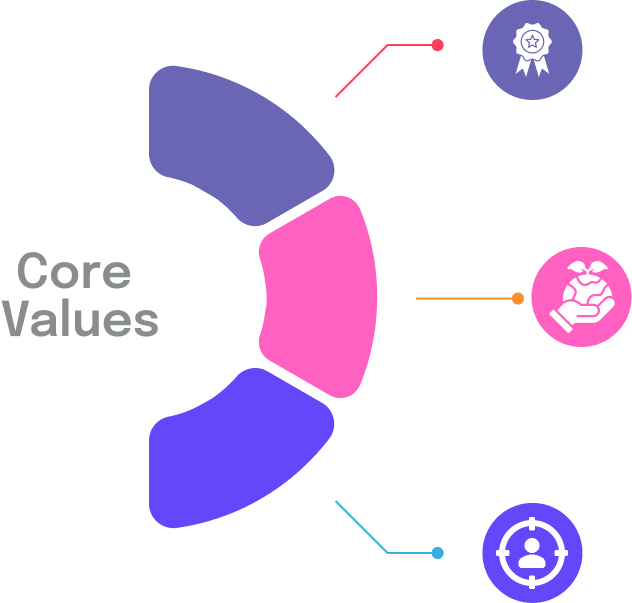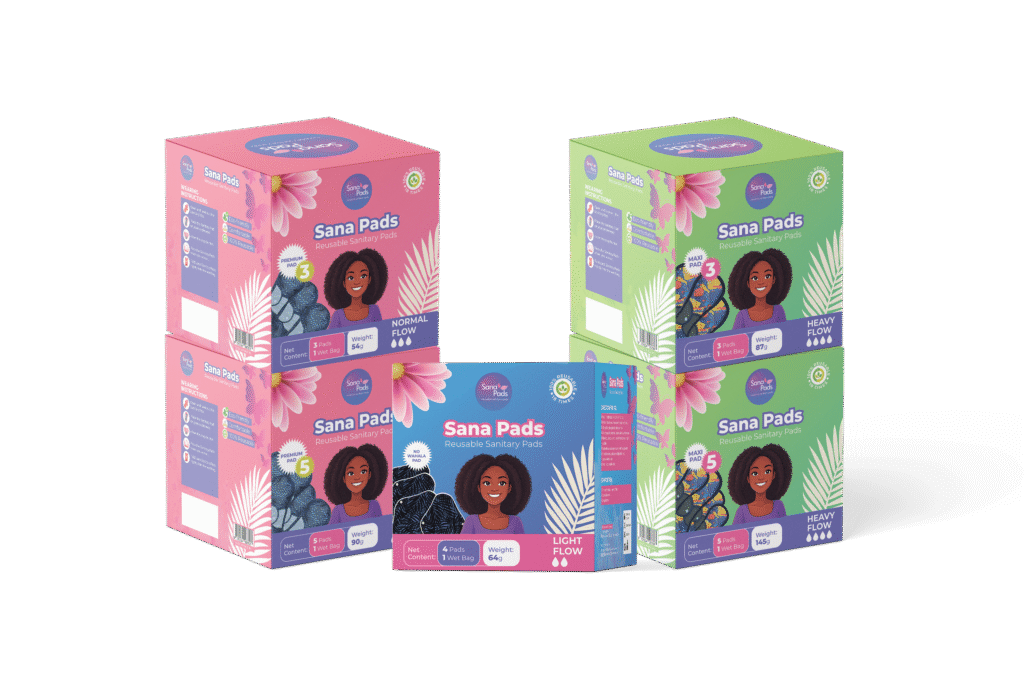How Reusable Sanitary Pads Can Improve Girls' School Attendance in Nigeria
Halima Akande dreaded the same five days every month. When her period arrived, she would stuff old wrappers, rags, and sometimes newspapers into her underwear, constantly fearing that a stain would show on her school uniform. The discomfort was unbearable, but the shame was worse. She couldn’t focus in class or participate in any activities, so she simply stayed home until it was over.
Today, Halima’s story is different. With access to reusable sanitary pads, she no longer misses school during her menstruation. Her days of absenteeism are behind her, and she can pursue her education with confidence and dignity.
Halima’s transformation reflects a growing solution to one of Nigeria’s most pressing educational challenges: period poverty is keeping millions of girls out of school. For NGOs, educators, and organizations working to improve girls’ education in Nigeria, reusable sanitary pads represent more than just a health product—they’re tools for educational equity and long-term empowerment.
The Hidden Crisis: Why Nigerian Girls Miss School Every Month
The Stark Reality of Period Poverty in Nigerian Schools
In Nigeria, approximately 37 million women and girls of reproductive age lack access to menstrual hygiene products due to financial constraints. This staggering number isn’t just a health statistic—it represents millions of lost school days, compromised education, and dreams deferred.
When a family in rural Kano struggles to afford school fees, buying sanitary pads for their daughters becomes an impossible luxury. A single pack of disposable pads can cost between N800 to N1,200, and for families with multiple daughters, the monthly expense quickly becomes overwhelming. The math is heartbreaking: in a household with four menstruating daughters, parents face spending nearly N10,000 monthly on disposable pads alone.
When Periods Mean Missing Education—Halima's Story
Girls like Zainab Yakubu, who used pieces of cloth to manage her flow, represent thousands of students across Nigeria who face an impossible choice every month. These makeshift solutions aren’t just uncomfortable—they’re unsafe, ineffective, and deeply embarrassing for young girls trying to focus on their studies.
The fear of leakage creates constant anxiety. Girls spend entire school days worrying about stains, avoiding participation in sports, and declining to answer questions at the board. Even when they attend school during menstruation, their learning suffers significantly.
The Numbers Tell the Story: 37 Million Girls Without Access
Research consistently shows that Nigerian girls miss an average of 24% of the school year due to menstruation-related challenges. That’s nearly one full day out of every four school days lost. Over the course of secondary education, this absence adds up to missing almost two full academic years.
These aren’t just missed classes—they’re missed opportunities for girls to build the knowledge and skills they need for economic independence. Moreover, the pattern of absence often leads to poor academic performance, increased dropout rates, and in some cases, child marriage as families lose hope in their daughters’ educational prospects.
The School Attendance Challenge: Beyond Just Missing Days
Academic Performance Drops When Girls Stay Home
When girls miss school regularly due to menstruation, they don’t just lose classroom time—they lose their place in the learning progression. Mathematics concepts build on each other, science experiments can’t be repeated, and group projects move forward without them.
Teachers in rural communities often report that some of their brightest female students show declining performance around age 13 or 14, coinciding with the onset of menstruation. These girls, who once excelled in their studies, begin struggling to keep up with coursework they’ve missed.
The Psychological Impact of Period Shame in Classrooms
The stigma surrounding menstruation in many Nigerian communities extends into the classroom. Girls who experience leakage face ridicule from classmates, creating long-lasting trauma that affects their confidence and willingness to participate in school activities.
Even girls who manage to attend school during their periods often sit in the back of classrooms, avoid raising their hands, and skip extracurricular activities. This self-imposed isolation reinforces negative feelings about their bodies and their place in educational spaces.
Breaking the Cycle: From Absenteeism to Dropout
The progression from missing school days to permanent dropout follows a predictable pattern. Initially, girls miss just a few days each month. However, as they fall behind academically and face increasing shame, some begin extending their absences. Eventually, the gap between their knowledge and their grade level becomes too wide to bridge, leading to permanent departure from education.
This cycle is particularly devastating in Nigeria, where educated women reinvest 90% of their earnings back into their communities. When girls drop out due to period poverty, entire communities lose the benefits of their potential contributions.
About us

1. Excellence
2. Environmental Sustainability
Empowering women sustainably with eco-friendly, reusable sanitary pads.
3. Customer-Centric
serve.
Why Reusable Sanitary Pads Are Game-Changers for Education
Long-Term Protection That Lasts Up to 4 Years
Unlike disposable pads that require monthly purchases, quality reusable sanitary pads can last up to four years with proper care. This longevity transforms the economics of menstrual health from a recurring monthly expense to a one-time investment in a girl’s education.
Sana Pads, for example, are designed with multiple absorbent bamboo layers and a waterproof backing that provides 8-12 hours of protection. This extended wear time means girls can attend full school days without worrying about changing pads or experiencing leakage.
Cost-Effective Solutions for Resource-Strapped Families
The mathematics of reusable pads is compelling for families and organizations alike. While disposable pads cost families thousands of naira annually, a set of reusable pads represents a fraction of that long-term cost.
For NGOs working with limited budgets, this cost-effectiveness enables broader impact. Instead of providing temporary relief through monthly disposable pad distributions, organizations can invest in reusable solutions that serve girls for years.
Building Confidence for Classroom Participation
Perhaps most importantly, reliable menstrual protection restores girls’ confidence in educational settings. When girls know they can trust their menstrual products to keep them dry and comfortable, they participate more actively in classroom discussions, sports, and social activities.
This confidence boost has ripple effects throughout their educational experience. Teachers report that girls using quality reusable pads show increased engagement, better attendance, and improved academic performance.
Real Impact Stories: How NGO Outreach Programs Transform Lives
Pad a Queen Initiative: 97% Reduction in Period-Related Absenteeism
The Pad a Queen Initiative (PAQi) in Ibadan, Oyo State, demonstrates the transformative power of well-designed reusable pad programs. Since October 2021, this NGO has distributed over 5,000 reusable pads to women and girls, with approximately 80% of beneficiaries being teenage schoolgirls.
The results speak for themselves: PAQi documented a 97% reduction in period-related absenteeism among girls who received their reusable pad kits. Almost every girl who previously stayed home during menstruation began attending school regularly.
“We have cases of girls who used to stay out of school until their period was over,” explains Saheedat Adetayo, PAQi’s Executive Director. “After receiving our reusable pads, these same girls recorded significant increases in class participation and extracurricular activities during menstruation.”
Success Stories from Abuja's Urban Slums
In Abuja’s urban slums, where 2,500 low-income schoolgirls face severe period poverty, targeted interventions have shown remarkable results. Girls who previously used unsafe materials like leaves or rags now attend school confidently throughout their menstrual cycles.
The Global Shapers Community’s Pad and Pant Project in Kuje Area Council equipped 50 secondary school girls with both reusable pads and the knowledge to make their own. This dual approach—providing immediate relief while building long-term capacity—created sustainable change in the community.
How Proper Menstrual Products Transform Learning Outcomes
Follow-up studies consistently show that girls with access to quality reusable pads don’t just attend school more regularly—they perform better academically. When girls aren’t worried about menstrual management, they can focus entirely on learning.
Teachers report observing these changes within just a few months of pad distribution. Girls become more active in group work, more likely to ask questions, and more confident in presentations. The transformation extends beyond academics to leadership roles and peer relationships.
Leak-proof
Test
Experience Unmatched Absorbency and Comfort with Sana Pads. In this video, we showcase the incredible absorbency and leakproof capabilities of our reusable sanitary pads, proving why they are the most reliable in Africa.
Making It Work: Implementing Reusable Pad Programs in Schools
Essential Components of Successful School Programs
Effective reusable pad programs require more than just product distribution. Successful initiatives combine quality products with comprehensive education, proper facilities, and ongoing support.
The most impactful programs include menstrual health education sessions that address myths and misconceptions. Girls need to understand their menstrual cycles, learn proper pad care techniques, and receive guidance on recognizing signs of infection or other health issues.
Additionally, successful programs work with school administrators to ensure adequate WASH (Water, Sanitation, and Hygiene) facilities. Girls need private spaces to change pads, access to clean water for washing, and soap for proper hygiene.
Training Teachers and Students for Sustainable Impact
Teachers play a crucial role in sustaining program benefits. When educators understand menstrual health and can address period-related concerns sensitively, they create supportive environments that encourage continued school attendance.
Training programs should equip teachers to recognize signs of period poverty, provide basic menstrual health information, and connect students with appropriate resources. Male teachers, in particular, benefit from education that helps them respond appropriately to menstrual health needs.
Creating Safe Spaces and Proper WASH Facilities
Even the best reusable pads cannot fully address period poverty without adequate facilities. Schools need private toilets with locks, running water, soap dispensers, and disposal options for any disposable components.
Many successful programs include infrastructure improvements alongside pad distribution. This holistic approach ensures that girls can manage their menstruation with complete dignity and privacy.
The Sana Pads Approach: Quality Products for Lasting Change
Designed for Nigerian Girls' Needs
At Sana Pads, we understand that effective reusable pads must meet the specific needs of Nigerian girls. Our pads feature bamboo fiber absorbent layers that handle even heavy flows while remaining comfortable against the skin.
Each pad is designed for extended wear—up to 8-12 hours—so girls can attend full school days without interruption. The waterproof backing prevents leakage while remaining breathable, and the snap closures ensure secure fit throughout active school days.
Supporting NGOs and Schools with Bulk Solutions
We work directly with NGOs, schools, and distributors to provide bulk solutions that maximize impact while minimizing costs. Our Starter Kits include three reusable pads plus a carrying pouch, providing girls with enough protection to manage their cycles confidently.
For organizations serving girls with heavier flows, our Heavy Bleeder Kits offer additional absorbency and coverage. We also provide training materials and support to help organizations implement comprehensive menstrual health programs.
Beyond Products: Education and Empowerment
Our commitment extends beyond manufacturing quality pads. We provide educational resources that help organizations address the full spectrum of menstrual health needs, from basic anatomy education to practical pad care instructions.
We believe that lasting change requires not just better products, but better understanding. That’s why we support our partners with training programs, impact measurement tools, and ongoing technical assistance.
Time to get involved
NGO Outreach: How Your Organization Can Make a Difference
Getting Started with Reusable Pad Distribution
Organizations interested in implementing reusable pad programs should begin with needs assessment and community engagement. Understanding local attitudes toward menstruation, existing resources, and specific challenges helps design more effective interventions.
Start with pilot programs in select schools or communities. This approach allows you to refine your methods, measure impact, and build evidence for larger-scale implementation. Document both quantitative outcomes (attendance rates, academic performance) and qualitative changes (confidence levels, participation rates).
Measuring Impact and Tracking Success
Effective programs include robust monitoring and evaluation components. Track attendance rates before and after pad distribution, monitor academic performance indicators, and conduct regular follow-up surveys with beneficiaries.
Key metrics include: school attendance rates during menstruation, academic performance trends, dropout rates, and self-reported confidence levels. Regular follow-up visits ensure that girls are using their pads correctly and address any emerging challenges.
Building Sustainable Partnerships for Long-Term Change
The most successful reusable pad programs develop partnerships across multiple sectors. Work with schools to integrate menstrual health into health education curricula, partner with local health facilities for advanced care needs, and engage parents and communities to address cultural barriers.
Consider partnering with local producers like Sana Pads to ensure reliable supply chains and support local economic development. These partnerships create sustainable funding models and reduce dependence on external donor support.
Ready to transform girls' education in your community?
Contact Sana Pads today to learn about our bulk pricing options, training resources, and partnership opportunities. Together, we can ensure that no girl misses school because of her period.
When we provide girls with quality reusable sanitary pads, we don’t just solve a health problem—we unlock educational potential, foster confidence, and create pathways to economic empowerment. In a country where educated women drive community development, keeping girls in school during menstruation isn’t just about periods—it’s about building Nigeria’s future, one girl at a time.
For NGOs and bulk orders, contact our team to discuss how we can support your programs.
Have more questions about reusable sanitary pads? Visit our Knowledge page for additional tips and guides, or learn more about our mission to end period poverty sustainably.
When we choose reusable pads, we choose:
- Economic empowerment: Families save money that can be invested in education, business, and other priorities
- Health dignity: Chemical-free, comfortable protection that doesn’t compromise well-being
- Environmental responsibility: Reducing waste and supporting sustainable practices
- Educational opportunity: Ensuring girls stay in school and reach their full potential
For wholesale buyers and distributors, partnering with quality reusable pad manufacturers like Sana Pads means supporting proven solutions that create lasting impact in Nigerian communities.
The girls and women in your community deserve period products that protect their health, support their dreams, and respect their dignity. Reusable pads deliver on all three.
Together, we’re not just changing periods—we’re changing lives.https://sanapads.com/contact-us/

Author: Margaret Ochegbudu

